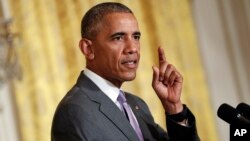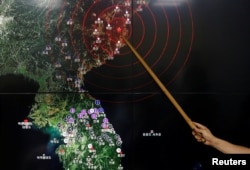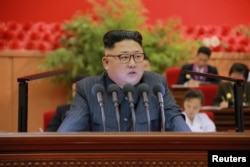President Barack Obama condemned North Korea's nuclear test Friday, calling it "a grave threat to regional security and to international peace and stability."
In a White House statement, the president said North Korea's "provocative and destabilizing actions" had served "to isolate and impoverish its people through its relentless pursuit of nuclear weapons and ballistic missile capabilities."
The U.N. Security Council met in a closed session Friday afternoon in New York. The council president, New Zealand Ambassador Gerard van Bohemen, told reporters that the 15 members strongly condemned the underground nuclear test and agreed to “work immediately on appropriate measures” contained in Article 41 of the U.N. Charter. That clause covers sanctions.
“The council must use every tool at its disposal to change North Korea’s calculus,” U.S. Ambassador Samantha Power told reporters. She said Washington would work with its international partners “to vigorously implement” existing measures in four previous U.N. resolutions. “And we will take additional significant steps, including new sanctions, to demonstrate to North Korea that there are consequences to its unlawful and dangerous actions.”
Japan’s envoy, Koro Bessho, said his government would seek “a fresh resolution, with fresh measures.”
In March, the council passed its toughest and most extensive set of sanctions to date on North Korea. It remains to be seen what new and strengthened measures the council will be able to agree on.
China’s U.N. ambassador, Liu Jieyi, walked away without answering a reporter’s question about Beijing’s support for additional sanctions. But he did say Beijing was “opposed to the testing and we believe that it is more urgent than ever to work together to achieve denuclearization of the Korean Peninsula.” He called on “all sides” to refrain from mutual provocation.
U.N. Secretary-General Ban Ki-moon, himself a former South Korean foreign minister, strongly condemned the underground nuclear test as a “brazen breach” of council resolutions.
“For the fifth time in recent years, the DPRK alone has broken the international norm against nuclear tests,” Ban said. “This unacceptable act endangers peace and security in the region and is another vivid reminder of the urgent need to strengthen the global nuclear test ban regime.”
Ban said he was counting on the Security Council to remain united and take appropriate action.
'Consequences' for North Korea
The latest and possibly largest North Korean nuclear test ever occurred as Obama was returning to Washington from his trip to Asia. While aboard Air Force One, he spoke by telephone with both South Korean President Park Geun-hye and Japanese Prime Minister Shinzo Abe.
Obama said they all agreed to implement new sanctions. The president also reaffirmed the U.S. commitment to defend its allies in Northeast Asia through deployment of the Terminal High Altitude Area Defense (THAAD) system in South Korea.
U.S. Defense Secretary Ash Carter, who was in Norway, also condemned the test at a news conference with his Norwegian counterpart.
Carter said he spoke with the South Korean defense minister, and they agreed the world needed to hold North Korea accountable. Carter said this test might strengthen resolve to get the THAAD system in place sooner. He added that it now was up to China to reverse the trend of North Korean nuclear escalation.
China responded to news of the test by saying it firmly opposed such actions by Pyongyang. A statement urged North Korea to adhere to its promises about nuclear non-proliferation, and it criticized the country for disregarding international objections.
China’s foreign ministry spokeswoman, Hua Chunying, urged North Korea to “stop taking any actions that worsen the situation. Any actions solely in one side’s interest will only escalate the situation.”
China monitoring radiation
Meanwhile, Beijing said China had started emergency measures to monitor radiation rates and environmental pollution along its border with North Korea.
In announcing the nuclear test, North Korea called it "part of responsive measures to threats and sanctions from the U.S. and enemies denying our strategic position as a nuclear state." The White House statement reaffirmed the U.S. position on the issue: "The United States does not, and never will, accept North Korea as a nuclear state."
The Obama administration has followed a policy of “strategic patience,” knowing that North Korean leader Kim Jong Un has shown no interest in negotiations over its nuclear program. At a news conference Thursday in Laos, Obama acknowledged that persuading Pyongyang to change its behavior had been difficult.
He pointed to unsuccessful diplomatic approaches during Republican and Democratic administrations over the past decade, and he said North Korea had not only failed to meet its international obligations but also had given no indication it was inclined to do so anytime soon.
Protection for U.S. allies
“We are going to make sure that we put our defensive measures in place so that America is protected [and] our allies are protected," the president said. "We will continue to put some of the toughest pressure that North Korea has ever been under as a consequence of this behavior. Can I guarantee that it works? No. But it is the best option that we have available to us right now.”
On Capitol Hill, the Republican House speaker, Paul Ryan of Wisconsin, condemned North Korea for threatening U.S. allies, but also criticized Obama: “This destabilizing activity is also a consequence of the administration’s failed policy of strategic patience and its hollow pivot to Asia. The president should immediately make full use of the sanctions authorities Congress gave him earlier this year, and he should join me in urging China, as Pyongyang’s chief sponsor, to fully enforce the international sanctions on the Kim regime.”
The Republican chairman of the House Foreign Affairs Committee, Representative Ed Royce of California, said the North Korean test showed that Obama’s efforts to enforce sanctions were falling short: “Most notably, the administration has yet to impose sanctions on any of the many Chinese companies and banks that, according to a recent U.N. report, continue to support the North Korean regime. This must change. We’ve seen before that China will only comply with sanctions if Chinese banks face real consequences for doing business in North Korea.
“The United States and our foreign partners should also act quickly to sanction North Korea’s state-owned airline," Royce added. "Air Koryo continues to flagrantly violate the ban on luxury goods and has been implicated in the proliferation of SCUD missile parts. At the same time, the administration must also work with European governments to better block luxury items — including cars, watches and liquor — from reaching North Korea’s repressive ruling elite."
Action 'threatens stability'
The senior Democratic member of Royce's committee, Representative Eliot Engel of New York, said: "North Korea's apparent fifth nuclear test is another reckless action that threatens stability in the Asia-Pacific and further isolates the rogue regime. As the president reiterated, our commitment to our alliance partners in Northeast Asia is unbreakable. If the Kim regime believes that the United States and our partners will ever accept its nuclear weapons program as legitimate, they have made a grave miscalculation.
“Yesterday’s test is even more dangerous," Engel added, "because on Monday, Kim’s regime tested three ballistic missiles, all landing within 250 kilometers of Japan. Escalation like this only adds to the reasons why deployment of the THAAD missile defense system in South Korea and close cooperation with our allies is so important."
Friday's explosion was the fifth nuclear test and thought to be the largest to date, estimated at 10 kilotons and causing a magnitude 5.3 earthquake.
The last serious talks with North Korea on denuclearization, the six-party talks, ended in 2009.
VOA's Margaret Besheer contributed to this report from the United Nations.






